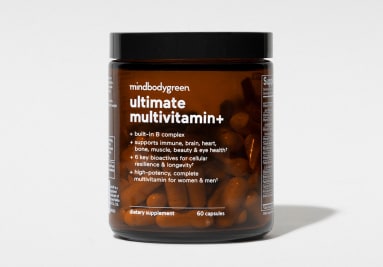Lots Of Multivitamins Skimp On Important B Vitamins: What To Look For


If you take a multivitamin, you probably expect it to live up to its "multi" title and provide you with a solid supply of all of the different vitamins and minerals you need. Unfortunately, though, that's not always the case. In fact, if you turned around your multivitamin bottle for a good look at the list of nutrients it contains, well, you might be in for a bit of a shock. Lots of multi formulas (even the trendy and well-known ones!) skimp on certain important nutrients, leaving gaps in the nutritional insurance policy you so proactively pop every day.
And though minerals often get the boot, they're not the only family that gets left out of multivitamins; these trusted daily supplements often either leave out certain B vitamins altogether or include them in teeny-tiny amounts or less-than-optimal formats.
Does your multi contain all the B vitamins?
ICYMI: There are eight total vitamins in the B vitamin family. In addition to a few you've probably heard plenty about—like B12, folate, and biotin—the B vitamins also include thiamin, riboflavin, niacin, pantothenic acid, and B6.
Of course, each individual B vitamin has its own role to play in the complex symphony that keeps your body humming along—and each is critical, explains mbg director of scientific affairs Ashley Jordan Ferira, Ph.D., RDN.* "Their roles include cellular metabolism and energy production, plus the normal synthesis of red blood cells, DNA, and neurotransmitters, to name a few,"* she explains. Pretty important stuff, no?
And while insufficiency or deficiency in one (or more) of the B vitamins is less common than other nutrients (like vitamin D, which nearly one-third of Americans1 are straight-up deficient in, for example), that doesn't mean we should brush them off.
Nutrient gaps absolutely exist for the B's. For example, about 10% of people do fall short on vitamin B62, which helps synthesize neurotransmitters in the brain3, allows for the production of antibodies and cytokines in the immune system44, and supports nervous system function5, among other things.* That doesn't really sound like a nutrient you want to miss out on...
And as Ferira points out, "If you are following a plant-centric, vegetarian, or vegan dietary pattern, that's awesome, but vitamin B12 must be top of mind since its top sources from the diet are all animal-based." And as it turns out, vitamin B12 is a multitasker when it comes to critical daily functions; you see, "B12 is required daily for the production of DNA, key amino acids, red blood cells, and cellular energy (ATP) from the food we eat, as well as immune cell function, neurological and cardiovascular health,"* explains Ferira.
Considering how popular B complex supplements are, it's safe to say health-conscious people understand just how important it is to get enough of these different vitamins—which raises the question: Why do so many multivitamins let them fall by the wayside?
"If there was ever an opportunity to fold one supplement into another (and save the customer some time and money), it would be to deliver a B complex with all eight essential B vitamins within a multivitamin," Ferira says. Thing is, "few multivitamins intentionally build in a complete B complex with premium bioactive and methylated formats of those nutrients."
Does your multivitamin offer bioactive and methylated B vitamins?
This brings up another important shortcoming of many multivitamins, including the ones that actually contain all eight B vitamins: their bioavailability.
Up to 40% of people have one or two mutations in their MTHFR gene, according to Wendie Trubow, M.D. Why does this matter when it comes to your multi? The MTHFR gene provides instructions for your body to convert vitamin B9 (folic acid) into its active form (methylfolate), which is then necessary for a whole-body process called methylation that's important for DNA protection, detoxification, and more. Research suggests people with MTHFR mutations produce up to 70% less methylfolate, which then has far-reaching effects on health.*
For this reason, it's crucial that people with the MTHFR genetic polymorphism take supplements that provide B vitamins (particularly B9 and B12) in their active, methylated forms, according to functional medicine expert Will Cole, IFMCP, DNM, D.C.* (And since many people with MTHFR mutations don't even know it, it's probably a better-safe-than-sorry move to always seek out B vitamins in this form.*)
You'll also want to look out for the most bioactive formats (ready for the tissues and cells in your body!) of the other B vitamins. For the entire B vitamin family, here's a cheat sheet:
- B1: thiamin mononitrate
- B2: riboflavin-5-phosphate
- B3: niacinamide
- B5: D-calcium pantothenate
- B6: pyridoxal-5-phosphate
- B7: D-biotin
- B9: L-5-methyltetrahydrofolate (MTHF)
- B12: methylcobalamin
What to look for in a multivitamin that embraces the B's
What all of this means for your daily multivitamin routine: Ideally, you'd take a formula that not only provides all eight of the B vitamins (and in relevant, potent amounts) but that also offers them in their bioactive forms to ensure you get the most out of them possible.
Multis that check all of these boxes are few and far between. That's where mbg's ultimate multivitamin+ comes in. "We intentionally formulated this next-generation multi to include a built-in, high-potency, and complete B complex, featuring 200% or more of the Daily Value of all eight B vitamins," Ferira says. "It also features all eight B's in their most bioactive forms—including methylation technology for folate (5-MTHF) and vitamin B12 (methylcobalamin)—to optimize bioavailability and bioactivity in the body for all consumers."*
Unless your health care practitioner has recommended otherwise, taking ultimate multivitamin+ allows you to forgo adding a separate B complex to your routine, notes Ferira. (Of course, you can also check out our hand-picked list of the best multivitamins out there right now for other options.)
The bottom line here: A closer look at your multivitamin formula might reveal that it either lacks certain B vitamins, contains suboptimal amounts of B vitamins, and/or fails to provide the Bs in their most bioactive forms. Taking a multi that addresses all of these B concerns can help you best optimize your nutrition and health.

Lauren Del Turco, CPT is a freelance health and wellness writer, editor, and content strategist who covers everything from nutrition to mental health to spirituality. Del Turco is also an ACE-certified personal trainer. She graduated from The College of New Jersey with a Bachelor of Arts in English and Creative Writing. When she’s not on deadline, you’ll find Del Turco hiking with her dogs, experimenting with new plant-based recipes, or curled up with a book and tea.
5 Sources
- https://www.cambridge.org/core/journals/british-journal-of-nutrition/article/vitamin-d-deficiency-and-insufficiency-among-us-adults-prevalence-predictors-and-clinical-implications/44E436843510FE6BDE856D5BCB9C651F
- https://www.ncbi.nlm.nih.gov/pmc/articles/PMC5579642/
- https://www.ncbi.nlm.nih.gov/pmc/articles/PMC4772032/
- https://www.cambridge.org/core/journals/british-journal-of-nutrition/article/selected-vitamins-and-trace-elements-support-immune-function-by-strengthening-epithelial-barriers-and-cellular-and-humoral-immune-responses/94B772EB747D1E5CD9FAC8F90937AA9F
- https://www.ncbi.nlm.nih.gov/pmc/articles/PMC6930825/

